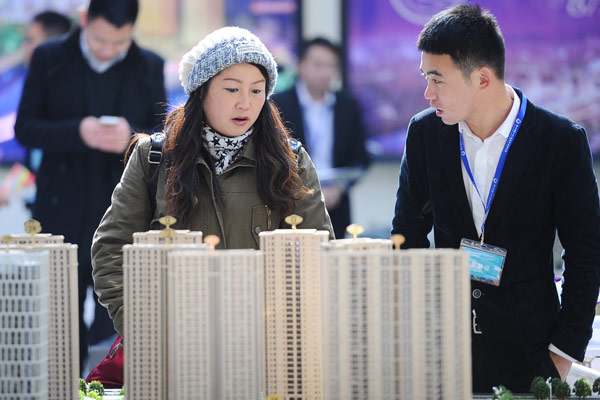
A woman talks with a salesman at a property market fair in Hangzhou, Zhejiang province.(Photo/China Daily)
Actual outgo under the new system may be lower, but clarity is yet to emerge
In late April, Greenland Group, one of the largest developers in China, forwarded its staff a plan, proposed by a consultancy, to cope with the new 11 percent value-added tax or VAT, which is higher than the 5 percent business tax.
The plan suggested that developers should try their best to have their projects taxed as per the pre-reform rate.
VAT is supposed to replace business tax this month onwards in the real estate industry. But, tax authorities have allowed developers to apply for their projects-existing as well as those under construction-to be taxed simply by the sale value, as an interim method.
Developers have long been levied a 5 percent business tax on their sales. Given the large amount of costs developers can deduct, the actual tax as per the VAT system could work out lower than before.
Developers' scrambling for the old tax rate underscores their worry over uncertainty over the new tax.
In late March, the Ministry of Finance and the State Administration of Taxation issued a circular clarifying that the cost of land-the biggest cost for developers that accounts for 30 to 70 percent of the project sale price-would be considered while computing the tax outgo. It came as a relief for developers that long feared the land cost may not be included in tax computation.
However, many real estate developers are still uncomfortable with the new tax, and prefer the previous 5 percent flat rate, which they said was simpler to calculate.
It was recommended that developers should apply for their existing projects to be subjected to "easy taxation" before the deadline of April 30, Greenland informed its staff. "Old projects" are defined as those that got the construction permit before May 1, or whose construction started before.
"We are still awaiting more detailed implementation rules, which would enable us to conduct a thorough assessment of which taxation is better," said an accountant with a Changsha-based developer, who sought anonymity. "The new system might save some tax. But we just want to ensure there is no increase in tax outgo."
For major developers, getting invoices would not be difficult as they have bargaining power. The problem is for millions of small contractors that might not be able to get invoices from their upstream businesses, experts said.
Alan Wu, national indirect tax leader for PwC China, said in general the reform is positive for developers, but there are some pending technical issues. For example, whether demolition cost would be included in the "land purchase cost".
"Now most land developers bid for local government contracts. Those demolition projects have been completed. But developers typically don't pay that cost. But there are still some land parcels that developers have to pay for, and may not get the invoice," Wu said.
Besides, the reform will allow, for the first time, VAT incurred by all the enterprises on newly acquired immovable properties to be deducted while computing tax outgo. This has created speculation that enterprises would be incentivized to buy properties, especially commercial properties, to gain tax credit, and thus lower tax burdens. Greater demand for properties would buoy the market.
Asked about the issue, Vice-Finance Minister Shi Yaobin said that he did not believe this would be the case.
"Companies' primary focus is profits. If an investment does not align with the company's business, I don't think they'll buy properties simply for the purpose of tax credit."
Other experts shared similar views. Wu said the purchase of real estate requires a large sum of money, which far exceeds the benefits in the new VAT credit. "Not many companies that are not real estate investment-focused have large enough cash flow to buy properties," he said.
Homebuyers' burden to ease
There is no cause for concern that the new value-added tax may increase homebuyers' tax burden, tax officials said in a circular.
For the first time, VAT will cover individuals besides companies in sales of existing homes. This has given rise to concern that buyers will pay more tax in such transactions.
The circular clarified that the VAT rate for individual secondhand home sales will be 5 percent, the same as the previous business tax rate.
Wang Kang, deputy director of the State Administration of Taxation, said last month that VAT will likely help reduce the tax burden. For, the taxable amount will likely be lower under the VAT system.
"The business tax rate was 5 percent. If people spent 1 million yuan, they would pay a 50,000 yuan ($7,720) business tax. But under the VAT system, taxable base will be 1 million divided by 1+5%," he said.
The buyers of secondhand homes will pay 2,400 yuan less as tax under the VAT system.


















































